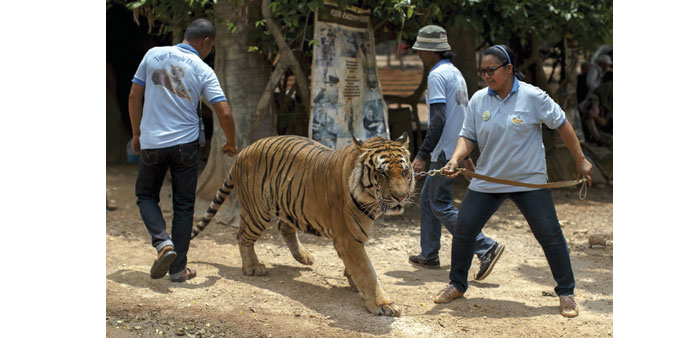Volunteers walk with a tiger on leash during a head count at the Wat Pa Luang Ta Bua, otherwise known as the Tiger Temple, in Kanchanaburi province, Thailand.
AFP/Bangkok
Thailand’s controversial “Tiger Temple” has been banned from charging tourists to visit dozens of big cats in their care, the parks department said yesterday, following a dispute between monks and officials over the welfare of the animals.
Wat Pha Luang Ta Bua in Thailand’s western Kanchanaburi province has long proved a hit among visitors who flock there to visit the monks and be photographed next to their huge feline pets.
But the temple has long had a controversial reputation among animal rights groups and Thai wildlife officials who say it is breaking the law in keeping the cats.
Thailand’s Department of National Parks, Wildlife and Plant Conservation say the temple has been keeping the animals without the proper paperwork and have vowed to seize them, sparking standoffs in recent weeks between officials and angry monks blocking their way.
DNP officials conducted a headcount on Friday, discovering 147 tigers in the monk’s care.
Officials had earlier indicated they would take the animals, despite concerns that the department might not have adequate facilities to look after such a large number of cats.
Yesterday, the DNP released a statement saying they had reached a deal with the monks allowing them to continue keeping the tigers under certain conditions including a ban on any further breeding or profiting from the cats.
“The temple should not gain commercial benefit from the tigers without permission from department such as selling tourists admission fees or charging them money to take photos,” the statement said.
The DNP said the temple had also agreed that the tigers are officially “confiscated state assets and under the responsibility” of the parks department but added that the monks were still responsible for the costs of looking after the cats.
Any breach of the deal, the statement added, would result in the DNP seizing the animals.
The temple could not be reached for comment yesterday but the deal raises doubts over whether the sanctuary can continue as a tourist attraction.
Local animal rights groups have accused the temple of failing to properly look after the tigers and engaging in wildlife trafficking, allegations the temple has denied.
In February, wildlife officials said they conducted a raid and discovered dozens of hornbills, jackals and Asian bears that were being kept at the sanctuary without the correct permits.

